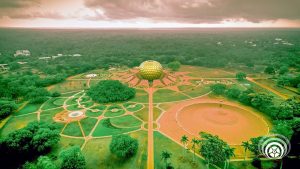Over the period, Auroville has developed a unique governance model, which can be called Aurocracy, which is based on the principles of collaboration, self-governance, and self-awareness. In this article, we will explore the Auroville specific governance model – Aurocracy. The Aurocracy governance model is based on the principles and purpose of Auroville as outlined in the Charter. It is a unique model of governance that seeks to promote harmony, unity, and progress among the residents of Auroville.
The term “Aurocracy” is derived from the Greek word “kratos,” which means “power” or “rule.” In Aurocracy, the power or rule is not vested in any individual or group, but in the Divine Consciousness that is said to guide and govern Auroville.
Aurocracy is a decentralized form of governance that is based on the principle of self-organisation. It is a system where decisions are made collectively and where the individual is empowered to take responsibility for his or her own actions. The aim of Aurocracy is to create a system where each person can live in harmony with others and with nature, while being able to contribute as a willing servitor to the well-being of the City as a whole.
The core documents of Auroville like the Auroville Charter, a Dream, and To be a True Aurovilian serves as the basis for the Aurocracy governance model. The Auroville Charter which was adopted in 1968 and outlines the vision and values of Auroville. It clearly states that Auroville is meant to be a place where people live in harmony, where the emphasis is on inner development and where there is no discrimination on the basis of race, nationality, religion or political beliefs.
The Aurocracy governance model is based on three key principles: collaboration, self-governance, and self-awareness.
- Collaboration is a fundamental principle of Aurocracy. It is the principle that underpins all decision-making processes in Auroville. In Aurocracy, decisions are made collectively, with the aim of finding the best possible solution for the City as a whole. Collaboration is seen as a way to ensure that everyone’s voice is heard and that decisions are made in a transparent and inclusive manner.
- Self-governance is another key principle of Aurocracy. It is the principle that empowers Aurovilians to take responsibility for their own actions and to contribute to the well-being of the City as a whole. Self-governance is based on the belief that Aurovilians are capable of making decisions for themselves and that they have a responsibility to contribute to the well-being of the City as a whole. Working groups are led by 4-8 individuals with intuitive intelligence. Each individual is expected to take responsibility for their own actions and decisions, and to work towards the common good of the City .
- Self-awareness is the third principle of Aurocracy. It is the principle that emphasizes the importance of inner development and personal growth. Auroville is seen as a place where individuals can come to explore their inner selves, to develop their own consciousness and to contribute to the growth of the City as a whole.
Aurocracy is a system where decision-making is decentralized and where power is distributed among the residents. The system is designed to encourage participation and collaboration among the Aurovilians. Decision-making in Aurocracy is based on the principle of consensus. In a consensus-based system, decisions are made after all City members have had the opportunity to express their opinions and concerns. Aurovilians are expected to take ownership of their lives and their work, and to contribute to the City in a way that aligns with the ideals of Auroville. This means that decision-making is decentralized, and there is a great deal of trust placed in individuals to make choices that are in the best interest of the City as a whole.
The Aurocracy governance model is based on a series of working groups, each with a specific mandate. These working groups are responsible for various aspects of City life, such as governance, education, environment, and economy. The working groups are made up of volunteers who have nominated themselves to the public service and vetted by the Foundation. From amongst the pool of self-nominated volunteers, a handful are selected by some randomised selection process. As each working group is responsible for making decisions related to their specific mandate and for implementing those decisions, the new volunteers naturally join the group and contribute to its purpose.
The Aurocracy governance model is also based on a series of committees, each with a specific mandate. The committees are responsible for overseeing the work of the working groups and for making decisions related to City -wide issues. The committees are also responsible for maintaining the Auroville Charter and for ensuring that the principles of Aurocracy are upheld. The committee members are nominated by the Governing Board of the Auroville Foundation and they ensure checks and balances on the working groups.
Another key feature of the Aurocracy model is its emphasis on collective decision-making. In Auroville, decisions are made through a process of consensus building, where all members of the City have an opportunity to participate and share their ideas. This ensures that all perspectives are considered, and decisions are made with the collective interest of the City in mind. According to the Aurocracy governance model, decision-making is based on the principle of consensus. This means that decisions are made through a process of dialogue and discussion until a consensus is reached. This process is designed to promote harmony and unity among the residents of Auroville.
Another important aspect of Aurocracy is the emphasis on transparency and accountability. Auroville operates on a system of open meetings, where all City members have the opportunity to voice their opinions and concerns. This helps to ensure that decision-making is participatory and engaging, and that everyone’s voices are heard. Additionally, Aurovilians are expected to be transparent in their actions and to hold themselves accountable for their behavior.
One of the challenges with this model is that it can take longer to make decisions since it requires input from all members. However, proponents of the Aurocracy model argue that the benefits of having a decision-making process that is inclusive and engaging far outweigh the potential downsides. While Aurocracy is often praised for its democratic and decentralized approach to governance, it is not without its challenges. For example, the emphasis on individual responsibility can sometimes lead to conflicts between City members who have different ideas about what it means to contribute to the City. Additionally, the lack of a formal hierarchy can sometimes make decision-making more time-consuming and difficult.
Despite these challenges, however, many Aurovilians feel that Aurocracy is a highly effective governance model that allows them to live in a City that aligns with their values and ideals. By placing a strong emphasis on individual responsibility, self-governance, transparency, and accountability, Aurocracy has created a unique and thriving City that continues to inspire people around the world.
In addition to consensus building, another important aspect of the Aurocracy model is its focus on self-governance. In Auroville, there are an external authority of the Government of India which ensures the manifestation of the idea of Auroville. However, the City fully relies on its own internal mechanisms to maintain order to manifest the ideal of Auroville.
One example of this emphasis on individual responsibility is the way in which Auroville handles conflicts. Rather than relying on a hierarchical system of authority figures to mediate disputes, Aurovilians are encouraged to work out their differences through open communication and dialogue. This approach not only empowers individuals to take control of their own lives, but it also fosters a culture of mutual respect and understanding within the City. While handling the issues of conflicts and disputes, the self-governance model is supported by a system of conscious justice that emphasizes mediation and reconciliation rather than punishment. When conflicts arise, members of the City are encouraged to come together and find a solution that is acceptable to all parties involved. Often, the surface conflicts are the result of deeper issues, and in Auroville, we attempt to got the root problem and heal rather than provide superficial band-aids.
The Aurocracy model represents a unique approach to governance that places a strong emphasis on collaboration, collective decision-making, and self-governance. While it is not without its challenges, many members of the Auroville City believe that this model has been instrumental in fostering a sense of unity, purpose, and shared responsibility among its residents. The Aurocracy model represents a compelling alternative to traditional forms of governance. Its emphasis on collaboration, inclusivity, and self-governance has helped to create a strong sense of City and shared responsibility within Auroville. While it may not be suitable for all communities, the Aurocracy model serves as a powerful example of what can be achieved through collective action and distributed decision-making.




